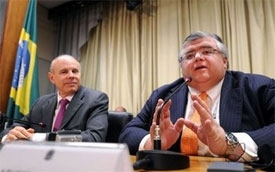Europe lacks 'credibility' for IMF post: Mexico candidate
 "It is clear that for the moment, they (European nations) have not managed to get to a situation where they have full credibility," Carstens told AFP on Wednesday, during a visit to Brasilia, where he met officials on his candidacy to head the International Monetary Fund.
"It is clear that for the moment, they (European nations) have not managed to get to a situation where they have full credibility," Carstens told AFP on Wednesday, during a visit to Brasilia, where he met officials on his candidacy to head the International Monetary Fund.
"So they need to make more efforts."
His comments came as Greece came under intense pressure from unions, creditors and a Moody's rating downgrade over tough reforms needed to balance its finances in exchange for a fresh rescue package and questions about the stability of eurozone members Portugal, Ireland and Spain.
Carstens said the eurozone nations facing financial woes "should adopt credible programs" to deal with the crisis that can be supported by the European Union and IMF.
"Until we make credible policy decisions, we cannot break the perverse dynamic of the markets," he said in the interview.
"But if we break this negative dynamic, we can enter into a virtuous cycle and countries can begin to see positive results."
The 52-year-old has been lobbying for the managing director's post vacated last month by Dominique Strauss-Kahn after the Frenchman was arrested and charged with sexual assault in New York.
But he faces opposition from many European countries that want to continue the long tradition of giving the top IMF post to a European with the World Bank headed by a US national.
French Finance Minister Christine Lagarde is considered the frontrunner, backed by many European nations.
Carstens met with Brazil's Finance Minister Guido Mantega, just two days after Lagarde visited to try to get Brazil to back her IMF candidacy.
"Latin America in general and Brazil and Mexico in particular should have a greater level of participation at the highest levels of the institution," Carstens told reporters after the meeting.
"It is very important that Latin America have a stronger voice."
For his part, Mantega agreed that the region "should be better represented within the structure of the Fund, given its growing economic importance -- which would mean having a greater role in the daily decision making."
The IMF is due to publish a full list of candidates by June 17. The final selection is expected to be announced by June 30.
The institution's executive board, whose members represent a country or a group of countries, is aiming to select the next chief by consensus, but could resort to a vote.
What the stars mean:
★ Poor ★ ★ Promising ★★★ Good ★★★★ Very good ★★★★★ Exceptional
Latest News
More News
- Russian President congratulates Vietnamese Party leader during phone talks (January 25, 2026 | 09:58)
- Worldwide congratulations underscore confidence in Vietnam’s 14th Party Congress (January 23, 2026 | 09:02)
- Political parties, organisations, int’l friends send congratulations to 14th National Party Congress (January 22, 2026 | 09:33)
- 14th National Party Congress: Japanese media highlight Vietnam’s growth targets (January 21, 2026 | 09:46)
- 14th National Party Congress: Driving force for Vietnam to continue renewal, innovation, breakthroughs (January 21, 2026 | 09:42)
- Vietnam remains spiritual support for progressive forces: Colombian party leader (January 21, 2026 | 08:00)
- Int'l media provides large coverage of 14th National Party Congress's first working day (January 20, 2026 | 09:09)
- Vietnamese firms win top honours at ASEAN Digital Awards (January 16, 2026 | 16:45)
- ASEAN Digital Ministers' Meeting opens in Hanoi (January 15, 2026 | 15:33)
- ASEAN economies move up the global chip value chain (December 09, 2025 | 13:32)
















 Mobile Version
Mobile Version